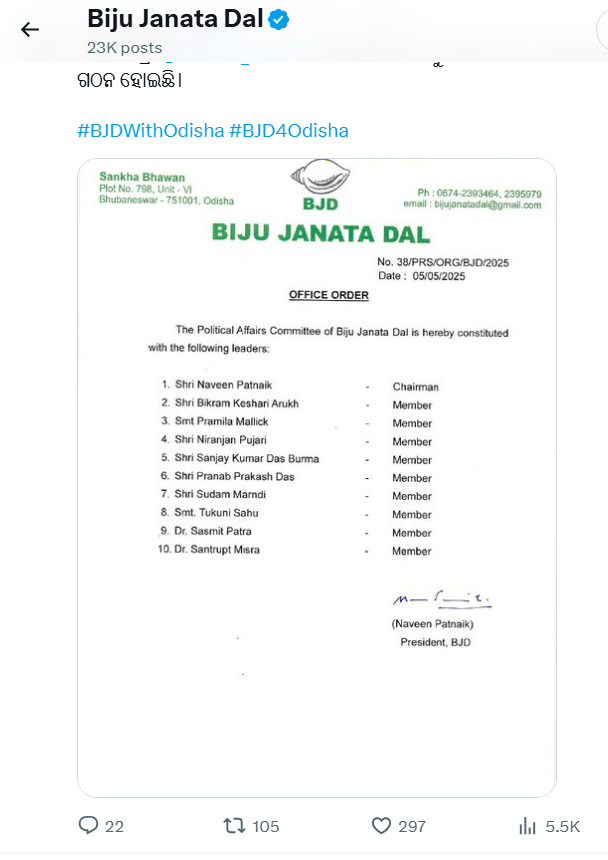Bhubaneswar: The Biju Janata Dal’s (BJD) recent formation of its Political Affairs Committee (PAC) after a prolonged hiatus has been met with a strikingly tepid response, a fact starkly illustrated by the meager engagement on their official X platform. First meeting on PAC will be held today.
This underwhelming reception, as evidenced by the limited likes and retweets, suggests deeper issues within the party and warrants a closer political analysis.
The PAC’s formation, coming after years of dormancy, has been perceived as a belated and possibly insincere move. This delay has eroded the committee’s perceived importance and relevance. Most importantly absence of BJD Veterans and presence of supporters of a specific group trying to influence party leadership, seems to be another cause of tepid response, feel insiders.
The lack of immediate, visible action or communication from the PAC following its announcement has contributed to the disinterest. Party members and followers likely expected a more dynamic and proactive approach.
The muted response signaling underlying dissent or factionalism within the BJD. Leaders who feel marginalized or excluded from the PAC have been expressing their discontent through passive resistance.
Power struggles and internal rivalries is manifesting in this lack of enthusiasm.
Odisha’s political landscape is dynamic, and voter sentiments are constantly evolving. The BJD’s traditional strategies seems losing their efficacy.
The recent elections in 2024, and the poorest performance of the BJD in these elections have a large impact on the morale of the party.
The lack of engagement reflects a growing disconnect between the party’s leadership and its grassroots supporters.
The BJD’s communication strategy, particularly on digital platforms failing to resonate with its target audience and the low engagement on X suggests a potential disconnect between the party’s online presence and its followers.
It seems that the PAC is perceived as not having real power within the BJD party structure, then leaders and followers see it as a waste of time, and not engage with it.
The lack of enthusiasm negatively impact the morale of BJD members, potentially leading to decreased participation and engagement in party activities.
Internal dissent and factionalism, could further weaken party unity and create vulnerabilities for the BJD, admit insiders.
The muted response would damage the BJD’s public image, portraying the party as out of touch or lacking in dynamism.
A weakened PAC will struggle to effectively address critical political issues and formulate strategic responses, potentially hindering the party’s ability to maintain its political dominance.
The BJD’s underwhelming PAC launch serves as a stark reminder of the challenges facing established political parties in navigating a rapidly changing political landscape.
To regain momentum and maintain its political relevance, the BJD must address the underlying issues contributing to the muted response, including internal dissent, communication deficiencies, and the need to adapt to evolving voter sentiments.
A thorough internal review and a renewed focus on grassroots engagement and effective communication are crucial for the party’s future.


